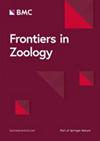To eat or to care? Factors shaping parental or infanticidal behaviours in male poison frogs during territory takeover
IF 2.6
2区 生物学
Q1 ZOOLOGY
引用次数: 0
Abstract
Parental care is costly for the caregiver. Therefore, parents should be able to discriminate between their own and conspecific offspring to avoid costly misdirected care. Infanticide, the intentional killing of conspecific young by adult individuals, occurs in many animal taxa. It has been shown to have several benefits for the perpetrator, such as increasing mating opportunities, ensuring dominance, or reducing a competitor’s fitness; but infanticide may also minimise risks of misdirected parental care. Previous studies in Allobates femoralis, a poison frog with parental care, have shown that males transport all tadpoles present in their territory to water bodies, regardless of whether they have sired the clutch or not. However, when taking over a new territory, males cannibalise clutches from the previous territory holder. These findings raise the question as to which factors actually shape parental care and infanticidal behaviour in male A. femoralis after territory takeover. To answer this question, we designed a laboratory experiment, in which we tested males with different territorial status and recent mating activity. We recorded tadpole transport and cannibalism and compared the occurrence of these two behaviours across our different experimental conditions. We found that territory ownership, relatedness to clutches, and possibly also recent mating activity influenced parental behaviours. However, we were unable to clearly disentangle the factors influencing cannibalistic behaviours. Our results also confirmed that males use territorial recognition to discriminate between their own and unrelated offspring, and that they commit infanticide likely to avoid misdirected parental care. Transport and cannibalism appear to be impacted by several factors in different ways. We found that the territorial status and relatedness to the clutch both influence parental behaviours in male poison frogs, whereas the factors influencing infanticidal behaviours remain unclear. Therefore, transport and cannibalism appear to be two independent processes, and factors influencing one behaviour do not necessarily affect the other. Further studies should investigate associated neuroendocrine changes, to better understand the mechanisms underlying parental and infanticidal behaviour in poison frogs. Our findings suggest that the decision-making processes involved in tadpole transport and clutch cannibalism appear to be more complex than previously thought.吃还是关心?雄性毒蛙在领地占领过程中形成亲代或杀婴行为的因素
亲代照顾对照顾者来说是昂贵的。因此,父母应该能够区分自己的后代和同种后代,以避免昂贵的误导照顾。杀婴,即成年个体故意杀死同种幼体,发生在许多动物类群中。研究表明,这对犯罪者有几个好处,比如增加交配机会,确保统治地位,或降低竞争对手的适合度;但杀婴行为也可能将父母照顾不当的风险降至最低。先前对一种由父母照顾的毒蛙Allobates femoralis的研究表明,雄性会将其领地内的所有蝌蚪运送到水体中,而不管它们是否产下了一窝。然而,当雄鸟占领一块新的领地时,它们会吃掉之前领地主人的后代。这些发现提出了一个问题,即在占领领地后,哪些因素实际上影响了雄性股雄性雄性的亲代照顾和杀婴行为。为了回答这个问题,我们设计了一个实验室实验,在这个实验中,我们测试了具有不同领土地位和最近交配活动的雄性。我们记录了蝌蚪运输和同类相食,并比较了这两种行为在不同实验条件下的发生情况。我们发现领地所有权,与窝的关系,可能还有最近的交配活动都会影响父母的行为。然而,我们无法清楚地理清影响同类相食行为的因素。我们的研究结果还证实,雄性利用领土识别来区分自己的后代和无关的后代,它们可能会为了避免错误的父母照顾而杀婴。交通和同类相食似乎受到几个不同因素的影响。研究发现,领地地位和对窝的亲缘关系都影响雄性毒蛙的亲代行为,而影响杀婴行为的因素尚不清楚。因此,运输和同类相食似乎是两个独立的过程,影响一种行为的因素不一定影响另一种行为。进一步的研究应该调查相关的神经内分泌变化,以更好地了解毒蛙双亲和杀婴行为的潜在机制。我们的研究结果表明,蝌蚪运输和离合器同类相食的决策过程似乎比以前认为的要复杂得多。
本文章由计算机程序翻译,如有差异,请以英文原文为准。
求助全文
约1分钟内获得全文
求助全文
来源期刊

Frontiers in Zoology
ZOOLOGY-
CiteScore
4.90
自引率
0.00%
发文量
29
审稿时长
>12 weeks
期刊介绍:
Frontiers in Zoology is an open access, peer-reviewed online journal publishing high quality research articles and reviews on all aspects of animal life.
As a biological discipline, zoology has one of the longest histories. Today it occasionally appears as though, due to the rapid expansion of life sciences, zoology has been replaced by more or less independent sub-disciplines amongst which exchange is often sparse. However, the recent advance of molecular methodology into "classical" fields of biology, and the development of theories that can explain phenomena on different levels of organisation, has led to a re-integration of zoological disciplines promoting a broader than usual approach to zoological questions. Zoology has re-emerged as an integrative discipline encompassing the most diverse aspects of animal life, from the level of the gene to the level of the ecosystem.
Frontiers in Zoology is the first open access journal focusing on zoology as a whole. It aims to represent and re-unite the various disciplines that look at animal life from different perspectives and at providing the basis for a comprehensive understanding of zoological phenomena on all levels of analysis. Frontiers in Zoology provides a unique opportunity to publish high quality research and reviews on zoological issues that will be internationally accessible to any reader at no cost.
The journal was initiated and is supported by the Deutsche Zoologische Gesellschaft, one of the largest national zoological societies with more than a century-long tradition in promoting high-level zoological research.
 求助内容:
求助内容: 应助结果提醒方式:
应助结果提醒方式:


